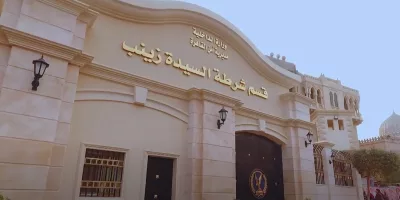A new working paper by the Committee for Justice analyzes the outcome of the first year of implementing the government-sponsored National Strategy for Human Rights in Egypt and its impact on the human rights situation.
CFJ said that the first-year report on the implementation of the National Human Rights Strategy contradicts the results of CFJ’s documentation of human rights violations on the ground.
The report was issued by the Egyptian Ministry of Foreign Affairs, at the end of the “year of civil society” announced by President Abdel Fattah el-Sisi at the beginning of 2022.
The working paper titled: “2022 The Year of Civil Society Year Outcome of The First Year of Implementing The National Human Rights Strategy,” argued that Egypt’s official discourse on the issue of human rights is the result of international pressure. The steps taken by Egypt in this regard came after 31 countries of the United Nations – headed by Finland – signed a statement on March 12, 2021 condemning human rights abuses in Egypt. Moreover, the report of the Universal Periodic Review of the human rights situation in Egypt at the 34th session of the Human Rights Council (November 2019) constituted evidence of the deterioration of Egypt’s reputation in human rights compliance internationally.
The paper examined the conditions of civil society in Egypt during the first year of implementing the strategy. It noted that the legislative track was devoid of amending the most important laws pertaining to civil society and NGOs in line with the priority of facilitating the work of civil society in 2022. Out of 30 bills that were proposed during the year, the authorities referred only four proposals to the Egyptian Parliament, not specifically related to civil society, but rather to economic and social rights, such as preventing early marriage and the rights of women working in the private sector.
The paper focused on the fact that some of the most important laws that still hinder the work of civil society – especially human rights NGOs- are still in force, such as; the Associations Law, which was amended in 2019, as well as the law regulating the right to circulate information and official documents. The reforms also did not address the Anti-Terrorism Law, the decisions regulating the work of the Supreme State Security Courts, and Articles 86, 86 bis, and 86 bis (a), (b), and (c) which legalized the death penalty.
Concerning civil and political rights, CFJ indicated that despite the authorities’ move to reactivate the Presidential Pardon Committee and the National Dialogue Committee, and to conduct legal reviews to release 814 defendants from pre-trial detention, along with expanding the conditional release decisions in favor of 20,000 inmates, CFJ’s field work in 2022 indicates that the authorities violated the rights of 6,612 citizens to liberty, and forcibly disappeared 7,283 citizens in unofficial detention facilities.
In the same year, CFJ’s Justice Watch Archive also documented 55 cases of extrajudicial killings, of which 46 died while the victims were imprisoned in connection with cases of a political nature; and eight deaths of prisoners held in connection with criminal cases. The violations that led to death were as follows: poor conditions of detention (45 cases), deliberate denial of health care inside detention facilities (43), arbitrary pre-trial detention (22), torture
inside detention facilities (16), in addition to the deaths of seven detainees during their enforced disappearance, and the execution of seven others after unfair sentences were issued against them in exceptional trials.
The paper also touched on the work of NGOs and civil society organizations. Although the regime in Egypt promoted that one of its achievements during 2022 was to formalize the registration of 34,206 associations, most of which are charitable and civil society associations, 2022 was a terrible year for civil and human rights organizations that were unable to formalize their status due to the intransigence of the authorities in accepting their registration, even after establishing the right of associations to be established by notification. At the same time, hundreds of lawyers and human rights defenders have been subjected to many violations because of their work in cases of a political nature and their defense of prisoners of conscience, as the authorities targeted them with enforced disappearance, arbitrary arrest, freezing funds, including them on terrorist lists, and banning them from traveling.
CFJ’s human rights defenders bulletin highlighted the announcement of the Arabic Network for Human Rights Information that it would stop its activities in Egypt after 18 years. Then we documented the arrest of nearly nine human rights defenders in 2022, such as the arrest of the 25-year-old human rights lawyer, Youssef Mansour; the renewal of the arrest of the human rights defender Sherif El-Rouby less than four months after his release, and the arrest of three female journalists from Mada Masr website and their interrogation. Moreover, the restrictions and harassment of activist Alaa Abdel-Fattahcontinued despite international calls for his release and for an end to the grave violations against him.
CFJ stressed that the alleged reforms mentioned in the annual report of the Human Rights Strategy did not touch upon the key issues of the human rights crisis in Egypt, represented in enshrining the criminalisation of the exercise of civil and political rights, ensuring impunity for perpetrators, and turning the judiciary into a tool of oppression and abuse.
At the end of its paper, CFC recommended the following:
First: defining the powers and functions of the work of the Presidential Pardon Committee, its decision-making structure, and expanding its scope of work to include more political prisoners, especially human rights defenders, the elderly, the sick and those who have been in pretrial detention for years.
Second: The strategy should adopt, in its legislative axis, the provisions of the constitution and the internationally agreed principles regarding the concepts of national security and the public interest, in a way that balances the rights of individuals and civil society vis-a-vis the political authorities.
Third: Amending the laws of associations and civil society organizations, demonstrations, terrorism, and decrees leading to referring civilians to the exceptional judiciary – Supreme State Security Courts, terrorism circuits of the Criminal Court and the Military Judiciary, in a manner that allows the return of civil, human rights and political work to the public domain.
Fourth: Stopping arbitrary arrests and enforced disappearance against citizens, and expanding the release of prisoners of conscience and political opponents, especially human rights defenders.
Fifth: Ending torture and systematic denial of health care inside Egyptian prisons and detention centers, and stopping the prolonged denial of family visits and prolonged solitary confinement.
Sixth: Erasing the criminal records of released political opponents and prisoners of conscience, especially young and middle-aged people, and planning policies and means to reintegrate them into education and employment institutions so that they can reintegrate into society and be able to earn a living.
Seventh: Opening a serious investigation into the crimes of enforced disappearance, torture and extrajudicial killings against prisoners and detainees, rehabilitating their families and providing them with financial compensation, and preventing the impunity of those responsible for these crimes.
Eighth: Enabling local and international civil society organizations to monitor the actions and policies of the executive authority against citizens, especially detainees and prisoners, and to recognize the right of detainees and prisoners to legal defense and access to justice through civil society organizations.
Ninth: Reversing death sentences, life and aggravated imprisonment issued by the military judiciary, Supreme State Security Courts (emergency) and terrorism circuits in the Criminal Court, and compensate victims for the periods of prolonged pretrial detention and unfair penalties that were issued based on confessions extracted under torture or on charges that fall within the rights and freedoms of peaceful assembly and expression of opinion.
Tenth: Expanding conditional release and implementing alternatives to pretrial detention, and abolishing probationary periods of police surveillance that prevent the released from integrating into society and subjecting them to re-arrest.






